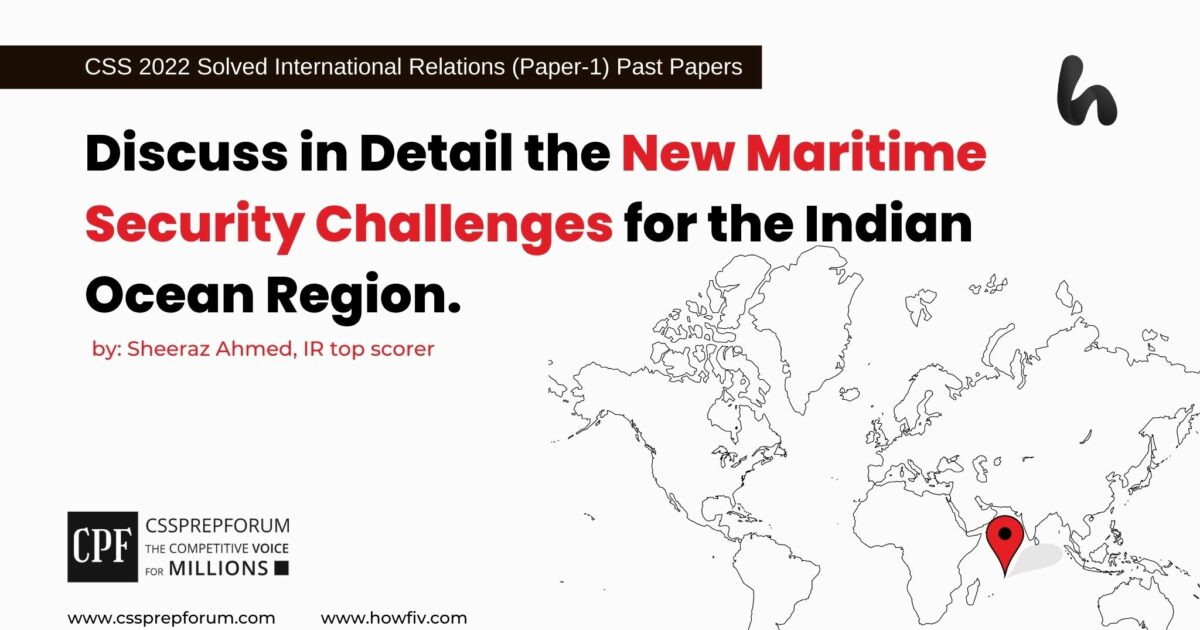Q8. Discuss in detail the new maritime security challenges for the Indian Ocean region. 2022

The Indian Ocean region faces several new maritime security challenges due to a combination of geopolitical, economic, and environmental factors. These challenges have significant implications for the countries in the region and global maritime security. Here are some key new maritime security challenges in the Indian Ocean region:
- Maritime Territorial Disputes: The Indian Ocean region is characterized by several maritime territorial disputes, such as the disputes over the South China Sea, the India-Pakistan maritime boundary, and the India-Maldives maritime boundary. These disputes involve competing territorial claims, resource exploration rights, and strategic control over important sea lanes. Tensions in these areas can escalate, potentially leading to conflicts and affecting regional stability.
- Piracy and Maritime Terrorism: The Indian Ocean region has been prone to piracy and maritime terrorism threats, particularly in the Horn of Africa, the Gulf of Aden, and the Malacca Strait. Somali piracy, in particular, has been a significant challenge, although concerted international efforts have reduced its incidence in recent years. Maritime terrorism, including the threat of piracy-linked terrorism and smuggling of weapons, poses risks to maritime trade and security in the region.
- Illegal, Unreported, and Unregulated Fishing: Overfishing and illegal, unreported, and unregulated (IUU) fishing have become significant concerns in the Indian Ocean. IUU fishing not only depletes fish stocks and threatens marine biodiversity but also has socio-economic implications for coastal communities that rely on fishing for their livelihoods. Combating IUU fishing requires regional cooperation, effective monitoring, and enforcement mechanisms.
- Maritime Trafficking and Smuggling: The Indian Ocean region serves as a transit route for various forms of trafficking and smuggling, including narcotics, arms, and human trafficking. These illicit activities pose security risks, contribute to regional instability, and have negative social and economic consequences. Cooperation among countries in intelligence sharing, maritime surveillance, and law enforcement is crucial to address these challenges.
- Environmental Challenges: The Indian Ocean region faces environmental challenges such as illegal dumping of hazardous waste, pollution from shipping and oil spills, and the impacts of climate change. These challenges not only pose risks to marine ecosystems and biodiversity but also have consequences for human security, coastal communities, and the sustainable use of marine resources. Strengthening environmental regulations, enhancing disaster response capabilities, and promoting sustainable maritime practices are essential in addressing these challenges.
- Geopolitical Competition: The Indian Ocean region has witnessed increased geopolitical competition among major powers, including China, India, and the United States. This competition is driven by strategic interests, access to resources, influence over sea lanes, and the establishment of military bases. The presence of major powers in the region can lead to tensions and potential conflicts, affecting maritime security and regional stability.
- Cybersecurity: The digitalization of maritime infrastructure and the increasing reliance on information technology have made the Indian Ocean region vulnerable to cyber threats. Cyberattacks targeting maritime infrastructure, information networks, and maritime communication systems can disrupt maritime operations, compromise data security, and pose risks to maritime safety and security. Strengthening cybersecurity measures, enhancing information sharing, and building robust cyber defense capabilities are crucial in addressing this emerging challenge.
Addressing these new maritime security challenges in the Indian Ocean region requires comprehensive strategies that emphasize cooperation, dialogue, and capacity-building among countries in the region. Regional organizations such as the Indian Ocean Rim Association (IORA) and bilateral agreements play a vital role in fostering collaboration and promoting maritime security initiatives. Moreover, international cooperation and engagement are crucial to address these challenges effectively and ensure the stability and prosperity of the Indian Ocean region.